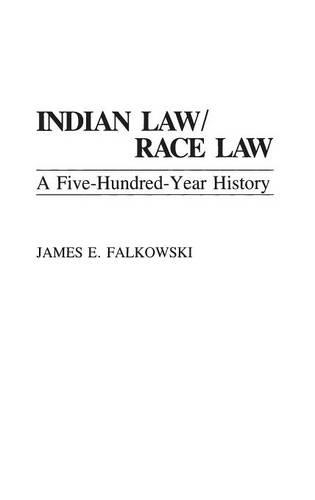
Indian Law/Race Law: A Five-Hundred-Year History
(Hardback)
Publishing Details
Indian Law/Race Law: A Five-Hundred-Year History
By (Author) James E. Falkowski
Bloomsbury Publishing PLC
Praeger Publishers Inc
16th June 1992
United States
Classifications
Tertiary Education
Non Fiction
Colonialism and imperialism
Human rights, civil rights
341.48109
Physical Properties
Hardback
192
Width 156mm, Height 235mm
454g
Description
"Indian Law/Race Law" reviews the historical development of the discriminatory body of law that applies to the indigenous people of the Western Hemisphere, beginning with the Papal Bull Inter Caetera of 1493 and ending with the recent developments of the United Nations' Working Group on Indigenous Populations. James Falkowski explains how the legal system of the European colonizers, which was later adopted by the European settler population, developed special doctrines that applied only to the indigenous peoples and legalized the erosion of the rights of the "vanishing race". Falkowski demonstrates how two systems of law - one applying to "civilized" peoples, and the other to the "backwards races" - were devised and justified. The author traces the development of "The Sacred Trust of Civilization", from its origin in the writings of Spaniard Francisco de Victoria and the Englishman Edmund Burke, through its internationalization in the League of Nations' Native Inhabitants Clause, and the United Nations' Non-Self-Governing Territories provisions. He evaluates the exclusion of the indigenous peoples from these protections through the rejection of the "Belgian Thesis". Falkowski goes on to review the refinements in the separate body of law that applies to indigenous peoples by the ILO, and recent efforts by the Working Group on Indigenous Populations to remedy this situation. The author also examines the treatment of indigenous peoples by international courts and the United States Supreme Court. He rejects theories justifying overland colonization and proposes the reform of Indian law through the application of international human rights principles. The book contains the complete text of important documents that pertain to the rights of indigenous peoples. "Indian Law/Race Law" may appeal to historians as well as those interested in Indian law, and the development of international and human rights law.
Reviews
A study by an attorney of several centuries of European treatment of non-European peoples incorporated within nation-states. Falkowski argues that since the time of Francisco de Vitoria and Bartolome de Las Casas, international law has been divided between a conception (which Falkowski calls racist) that Christian societies have rights not possessed by "backward" peoples and a human rights based view. He asserts that colonialism involving Western Hemisphere people incorporated within nation-states is still colonialism and still wrong. This subject is of increasing concern to scholars and others. The definitive treatise has not been written, but Falkowski is good on treatment by the League of Nations and the UN of self-determination issues, including whether indigenous peoples are entitled to self-determination. The book includes material on current efforts under UN auspices (in which Falkowski has been involved) to secure a universal declaration of the rights of indigenous people and enforcement of existing UN rules for the protection of non-self-governing territories. Extensive notes, but no illustrations. Academic collections.-Choice
This is an arresting study for students of human rights in general and for those concerned with the direction of Indian/white relations and federal Indian policy in the post-World War II period. This slim work on a complex topic should be mandatory reading for anyone interested in contemporary racism and the sociolegal dilemma facing American Indians on the threshold of the twenty-first century.-The Historian
"This is an arresting study for students of human rights in general and for those concerned with the direction of Indian/white relations and federal Indian policy in the post-World War II period. This slim work on a complex topic should be mandatory reading for anyone interested in contemporary racism and the sociolegal dilemma facing American Indians on the threshold of the twenty-first century."-The Historian
"A study by an attorney of several centuries of European treatment of non-European peoples incorporated within nation-states. Falkowski argues that since the time of Francisco de Vitoria and Bartolome de Las Casas, international law has been divided between a conception (which Falkowski calls racist) that Christian societies have rights not possessed by "backward" peoples and a human rights based view. He asserts that colonialism involving Western Hemisphere people incorporated within nation-states is still colonialism and still wrong. This subject is of increasing concern to scholars and others. The definitive treatise has not been written, but Falkowski is good on treatment by the League of Nations and the UN of self-determination issues, including whether indigenous peoples are entitled to self-determination. The book includes material on current efforts under UN auspices (in which Falkowski has been involved) to secure a universal declaration of the rights of indigenous people and enforcement of existing UN rules for the protection of non-self-governing territories. Extensive notes, but no illustrations. Academic collections."-Choice
Author Bio
JAMES E. FALKOWSKI is a Fresno County Deputy District Attorney in Fresno, California. His degrees include a J.D. from the University of California at Davis and an LL.M. (International Human Rights Law) from the University of Essex.
